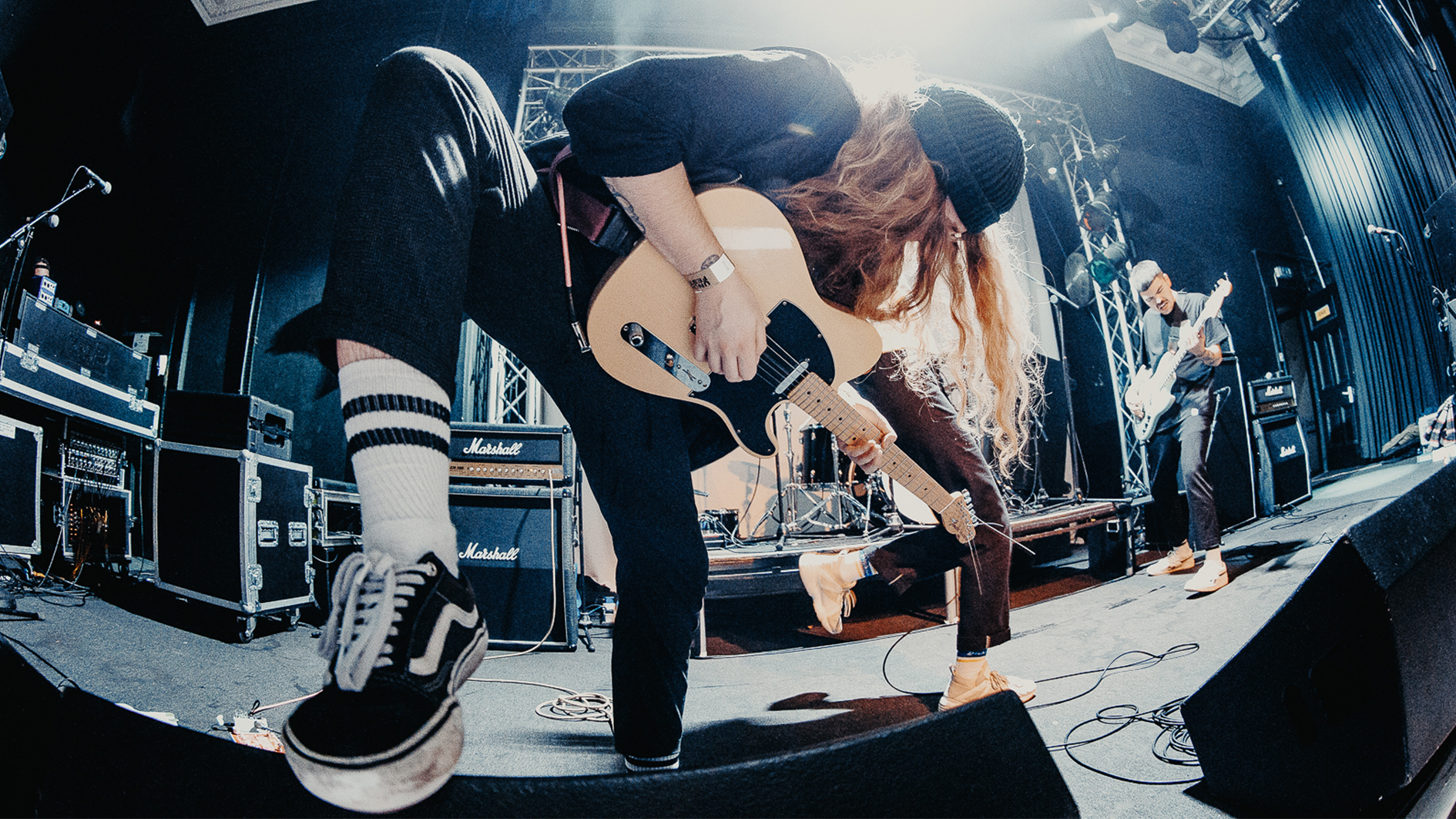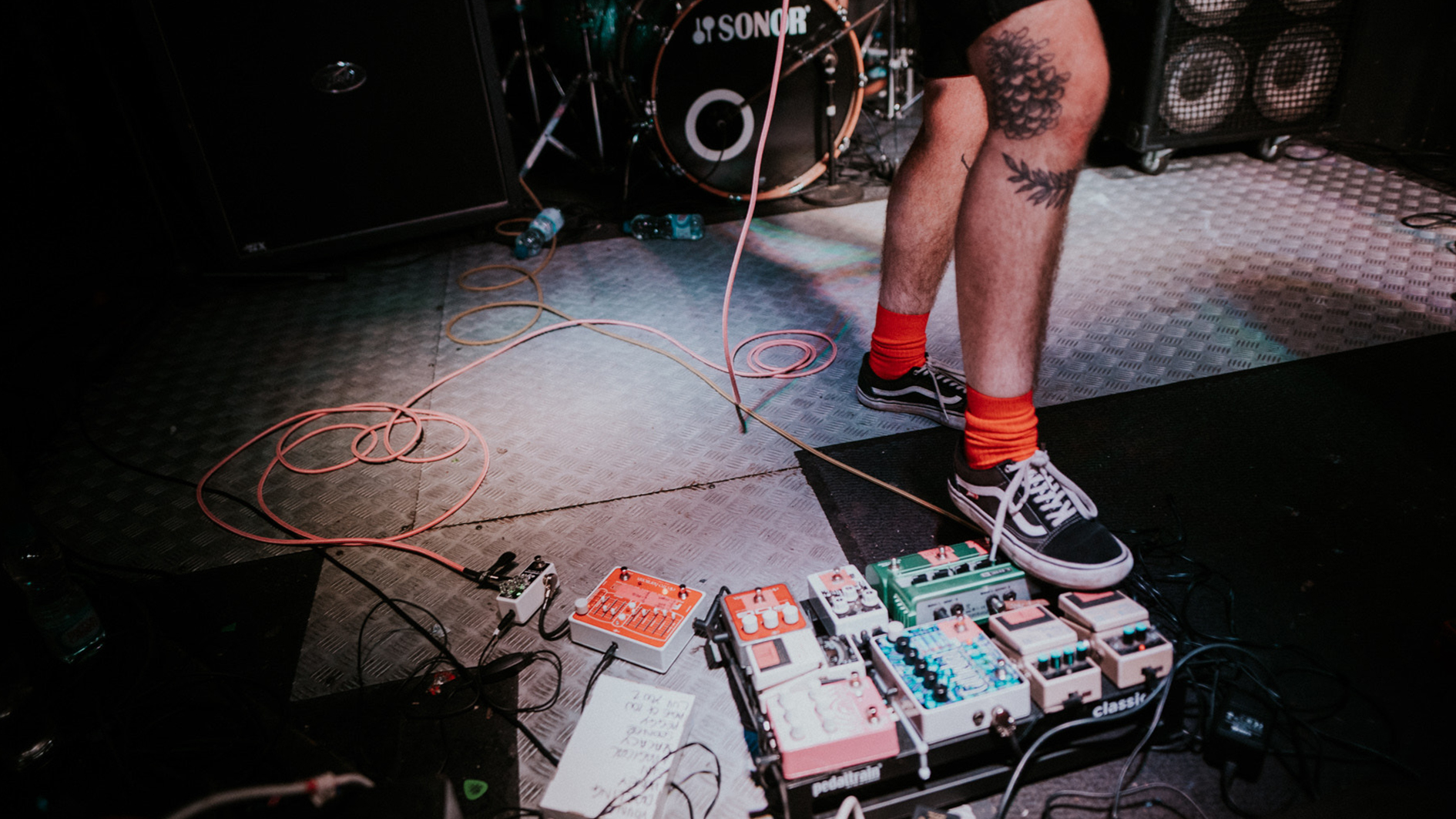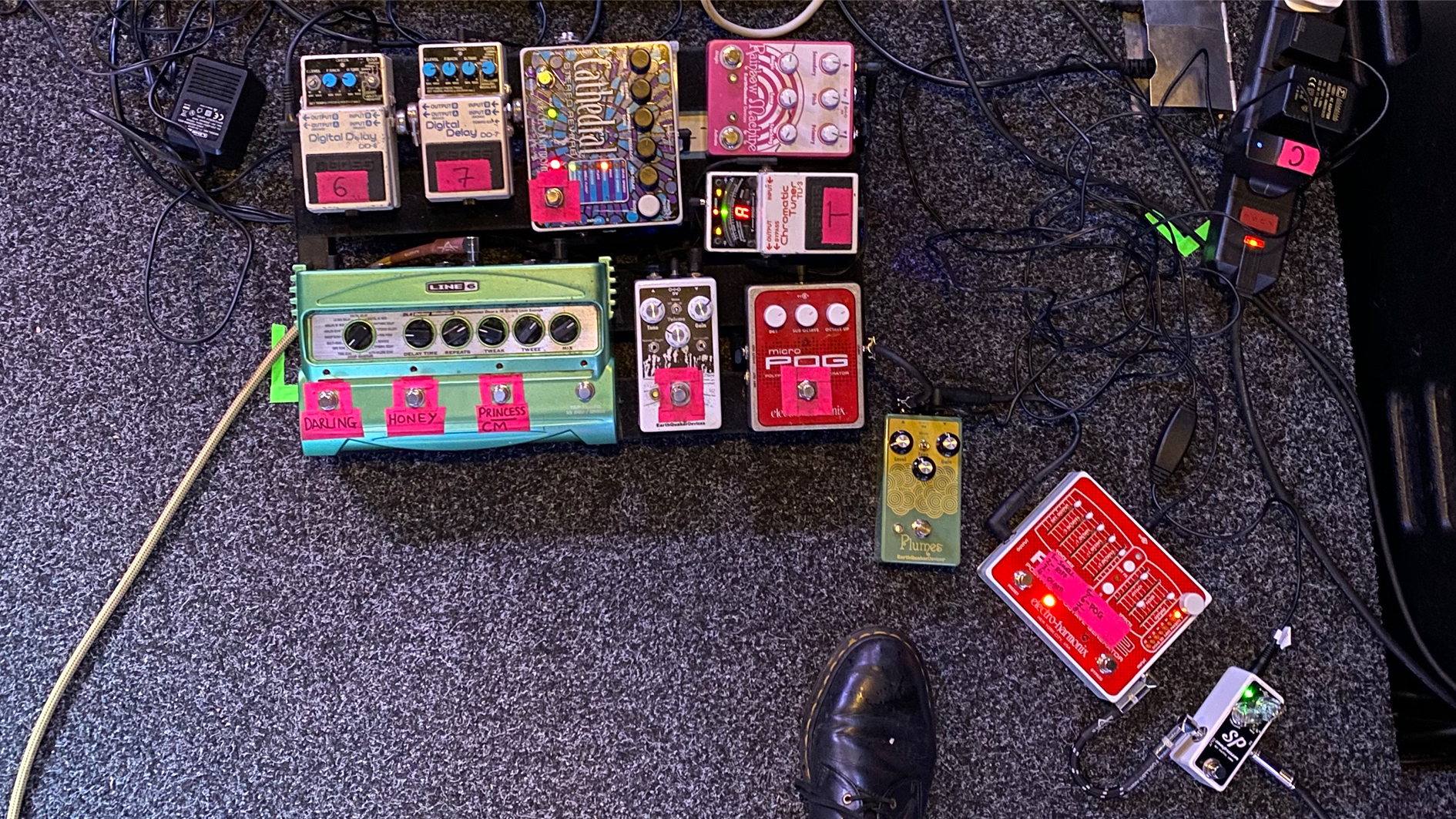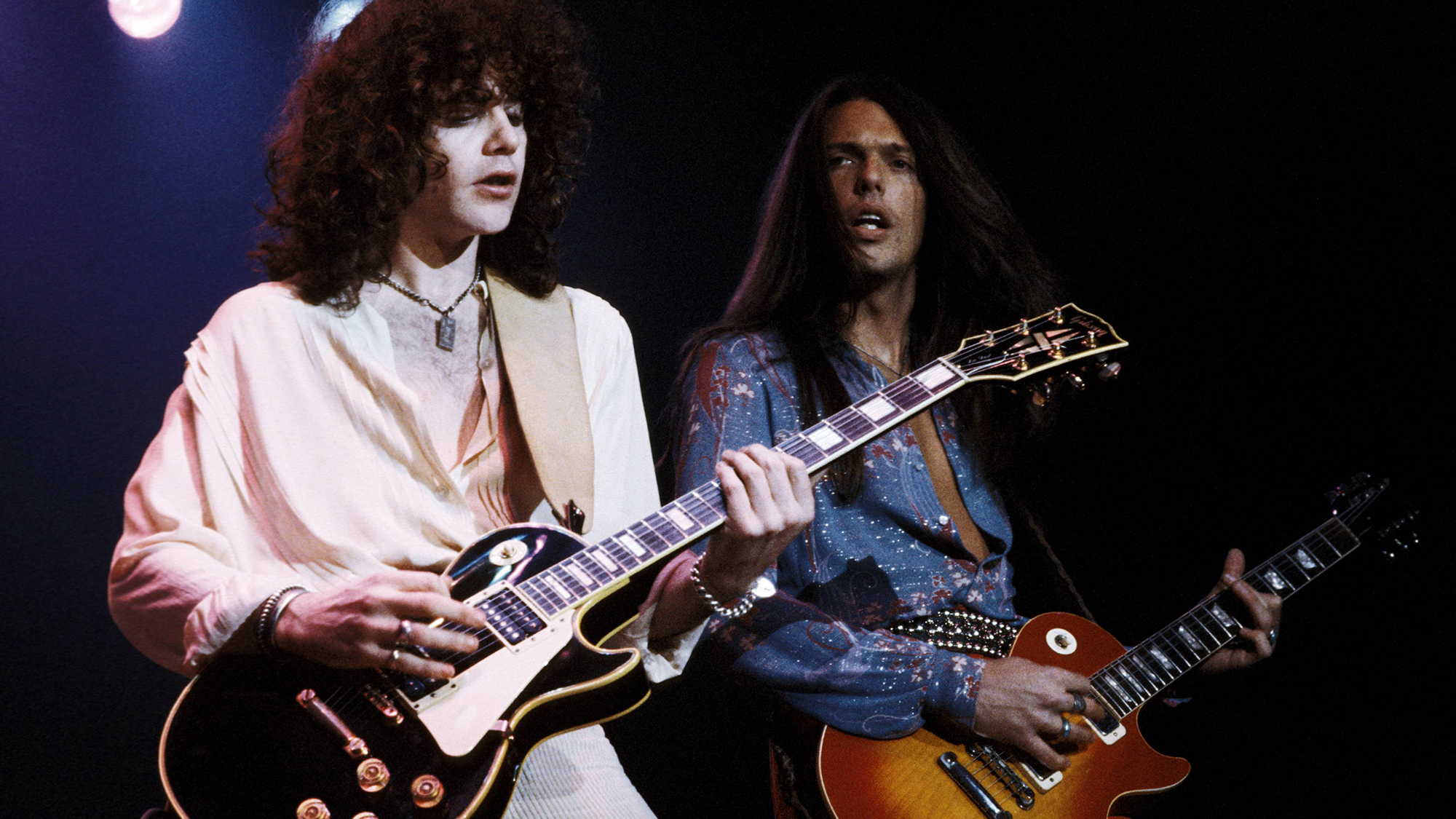Orchards’ Sam Rushton: “We’re told we’ve got happy breakdowns… metalheads seem to like it”
We talk to the whirlwind guitarist behind the UK’s expansive math-pop picks

All the latest guitar news, interviews, lessons, reviews, deals and more, direct to your inbox!
You are now subscribed
Your newsletter sign-up was successful
Sam Rushton - the man who would form and become the guitarist in the UK’s most exciting alt-pop export, Orchards - knew he was onto a good thing immediately. Studying in Brighton, one of the first exercises on his Professional Musicianship degree saw him paired with drummer Will Lee-Lewis.
“He just started playing and I remember turning to him and being like, ‘Is that Tetragrammaton by The Mars Volta!?’” laughs Sam. And he said, ‘It is, man! Yeah!’ I immediately said, ‘I’m starting a band, do you wanna play drums?’”
The guitarist hails from Liverpool but had joined the course in Brighton, UK, alongside his long-term bass collaborator Dan Fane. It was here, in these fertile surroundings, that Orchards first took root. Now completed by vocalist Lucy Evers, it's funny to picture the group in a mundane classroom environment, nodding to the feedback and wondering if their tutor had ever listened to The Fall Of Troy.
The kaleidoscopic math-pop maelstrom that is an Orchards song feels far removed. Listen to the infectious bottled-summer of Luv U 2, Honey or Sincerely Overwhelmed and you’ll hear a combination of punk-edged pop, prog shifts and happy heaviness.
Amid it all is Sam’s immediately recognizable space-pop tone, a ricocheting combination of layered delays, weird amps and colorful modulation that feels equal parts mastery and madness.
With debut album Lovecore due to drop on 13 March, we spoke to Sam about how he builds his sound, his secret sludge-metal credentials and get a guided tour of his ever-expanding pedalboard.
Effects play a huge part in your playing. Have you always been a shoegazer? Did you ever have a shredding phase, for instance?
All the latest guitar news, interviews, lessons, reviews, deals and more, direct to your inbox!
“I’ve never been about that. There are bands like Polyphia that I can get down to, and Chon, who make me go ‘Phwoaar!’ But I’ve never been one to sit in my room and learn to shred. It was never like that. I just found mates that liked music and we just started playing together...
One of the fellas that owned the studios showed me his pedalboard - and my mind blew up! From that moment on, it was like, ‘Pedals it is, then!’
"At some point, I began listening to Queens Of The Stone Age and they’ve got loads of nice tones, so that’s when I first started to look at the Marshall amp and tuner setup and thinking, ‘Why aren’t you sounding like that!?’”
So when did you start playing with effects?
“It was when some friends opened a rehearsal space [in Liverpool]. We started going there and they got me onto The Mars Volta and Incubus and then At The Drive-In and Fall Of Troy. So then I did the classic thing and got a Line 6 Spider amp, thinking, ‘I can do all of these effects!’
"I started creating these crazy tones and writing music with them, but I realized I wouldn’t always be able to take the amp with me to shows. One of the fellas that owned the studios showed me his pedalboard - and my mind blew up! From that moment on, it was like, ‘Pedals it is, then!’”
A photo posted by on
Apparently you and the band’s bassist Dan Fane were once in a sludge-metal group together, which seems in some ways a world away from Orchards. What did you learn from that?
“Yeah, me and Dan were in a sludge band called Iron Witch. I think I mainly learned how to drink, to be honest. It’s very different writing sludge music to what I do with Orchards. People in my life now sometimes know Iron Witch, but don’t know it was me and they’re flabbergasted by it!
“That band was a lot about tone, too, but a different kind of tone. A lot of it was down to this 80s Randall head I had. It was covered in carpet and I literally ran a modified Gibson SG with Bare Knuckle pickups into an SD1 Boss overdrive and into that head. I’ve still got it. It’s so gnarly. I think it might be broken, to be honest, because it only does filthy!”
Orchards is so bright and colorful and psychedelic - almost the polar opposite of sludge, but presumably there must be some common ingredient in your approach to both bands?
I guess that’s the secret: all of Orchards are metalheads
“We do seem to have a lot of fans who are metalheads. We never understood it, but we’ve played with [respected UK heavy types] Rolo Tomassi and Conjurer. We’re massive fans of theirs and they like our stuff, too.
"It’s the same with Employed To Serve. We’re massive fans of them, they’re massive fans of us. We played a festival in New York at the start of last year and this guy travelled from North Carolina with his dad to come and see us. He told us he strictly listens to hardcore and that his favorite band was Every Time I Die, ‘But I love you guys!’
"He said he thought we’ve got ‘happy breakdowns’ and that’s what he feels in our music - and a lot of metalheads seem to like it. But then me and Daniel grew up metalheads, Will [drums] grew up in a thrash metal band and Lucy [vocals] loves Iron Maiden, so I guess that’s the secret: all of Orchards are metalheads.”
We’re often told to find our own sound as players. It really feels like you’ve managed to do that. What was the key to that?
“My sound came from a place of necessity. We are a one vocalist, one drummer, one bassist and one guitarist band. I wanted to fill out space. Mike Einziger from Incubus is one of my main tone gods. He can go wild or he can play a simple riff and his subtle tone really makes it.
“There’s a lot of delay that happens in Orchards and that’s a big thing. Some delay is there to create huge space, some is very subtle and some is meant to be to-the-dot on a riff, like the intro to Honey, where it’s the delay making the riff. If you play it without it’s just ‘but-but-but-but’, and it sounds rubbish!
I don’t really know any of that gear stuff. I just put it there and go, ‘That sounds sick!
“Then I started to think about how I could get a delay sound but still be able to play intricate stuff, without it becoming crazy. I started experimenting with slapback delays and then I brought in some octaves and then when EarthQuaker Devices started getting involved it really streamlined the tone.”
So what do you look for in terms of guitar gear?
“This is funny because people are definitely going to be like, ‘He should not be putting that there!’ [Check out the gear guide below for Sam’s full ‘board.] I don’t really know any of that stuff. I just put it there and go, ‘That sounds sick!’
"It’s the same with that Randall head I used in Iron Witch. It’s probably broken but I ain’t messing with it, because it sounds incredible.
“I predominantly use a Fender Telecaster. I’m endorsed by Fender now, though I had my Telecaster before. I love it. I’ve got a new Fender Mexican Mustang, as well. Then my amp is a Yamaha YTA-95 [a '70s-era 2x12 solid-state combo].
"I found it in this second-hand shop in Brighton two or three years ago and it’s the nicest sounding amp. It takes pedals so well and I used that on the whole record. That’s my live sound when we play with our full rig.”

We’re seeing more and more players bringing in octave pedals these days. What tips do you have for doing that well?
“I think you should use it to build dynamics. So the verse will have one octave, or no octaves, and then the chorus might bring in the [Electro-Harmonix] POG 2 and more frequencies. People don’t realize they’re hearing it, but it’s there. I have to do a lot of tap-dancing.
“I remember a friend of mine who had a Whammy and he’d taped on to it, ‘Don’t overuse me!’ I remember thinking, ‘LOL, I’m going to overuse the hell out of mine!’ It’s got to play with the rest of the band. But whenever I get a new pedal, I always think push it, then bring it back to where you’re comfortable. And if you’re comfortable with blowing the speakers, that’s sick.”
Lovecore, your debut album, is out on 13 March. What’s the best thing you’ve learned about guitar during those sessions?
After a month of being in a room with four people you don’t know who to trust anymore!
“I would say committing to a tone is really important. For instance, my amp has a spring reverb and that wound up on everything. People get scared about those things and worry they can’t take it out of the mix, but our producer Jonathan [Hooks] was just like, ‘We’re listening to it now. We all think it sounds great, so let’s record it.’
"I think it’s important, particularly in rock music to do that. As our drummer said, collectively, we’ve all been doing music for ages, so if our ears say something’s right, it’s probably right. It gets harder, though. After a month of being in a room with four people you don’t know who to trust anymore!”
Lastly, you played SXSW [South by Southwest] and New Colossus Festival in the US last year. Any further plans or messages for the US?
“We got invited to come back to SXSW, but we couldn’t make it work this year. We’d definitely like to get back, particularly to the East Coast. When we played last year, we had people come to every show we did and sing along, which was insane.
"Judging by our Spotify figures, I think we might have more fans in America than we do in the UK, too. Our label looks after us worldwide, but our booking agent, who we love, doesn’t represent us in America, so if any booking agents want to get involved in the Orchards train, drop us an email!”
Sam Rushton's pedalboard

“My signal goes straight from the Tele into my compressor. Compression changed my whole tone. It just made everything jump out of my amp. You’ll probably get people going, ‘Well your technique needs to be better...’ But whatever! I put a compressor on and I don’t switch it off. The SP is quite small and once I got the sweet spot it was amazing.”
Electro-Harmonix POG 2
“This is the ‘big boy’ POG. Everyone says, ‘Have you got one of them Electro-Harmonix organ pedals?’ But it’s just all my pedals on together - and a big part of it is the POG 2. The middle-eight of Girlfriend is like some Blade Runner shit. There’s a real swelling organ sound and it’s driven by the POG II.”
EarthQuaker Devices Plumes
“This is the new addition. It’s kind of a take on the Tube Screamer. It’s a transparent overdrive and it’s already become a staple on my board.”
Electro-Harmonix Micro POG
“I used to have a DigiTech Whammy, but we have to fly sometimes now for international shows and it was just too big for my board. So I took it off and just used the Micro POG. It’s just an octave up and an octave down, you mix it and it’s cool.”
EarthQuaker Devices Dunes
“Before I got an endorsement with them, I went to an EarthQuaker Devices clinic led by the bass player of The Mars Volta [Juan Alderete] - and I actually won that pedal! It’s a really gnarly distortion and, with the POG, it just creates filth. It’s like the Queens Of The Stone Age tone I wanted when I was 15!”
EarthQuaker Devices Rainbow Machine
“This is my favorite. I’m thinking of getting a tattoo of this pedal. It’s this oscillating, modulating freaky thing. It’s got a magic button. Who doesn’t like a pedal that’s got a magic button!? I’ve found a way of turning it into a sort of modulated, chorus-y, slapback but it is still in-key.”
Electro-Harmonix Cathedral
“That just does all my reverb. Whatever I need.”
Boss DD-7 and DD-6
“I use the DD-7 for really big, modulated tones with a load of other pedals. Then I have a DD-6, which is for slapback and it’s on all the time. I think it’s like when you’re cooking or something. People never go, ‘I can really taste that garlic and onion you put in when you first started cooking.’ But that’s the base of the flavor.
"It’s the same with slapback. People are always going, ‘What’s that octave effect? What’s the Rainbow Machine?’ But that base is the little slapback.”
Line 6 DL4
“I don’t use loops, so I just use it to store my delays. Soon I will have five delays on the board, once I add the [EQD] Avalanche Run.”

Matt is Deputy Editor for GuitarWorld.com. Before that he spent 10 years as a freelance music journalist, interviewing artists for the likes of Total Guitar, Guitarist, Guitar World, MusicRadar, NME.com, DJ Mag and Electronic Sound. In 2020, he launched CreativeMoney.co.uk, which aims to share the ideas that make creative lifestyles more sustainable. He plays guitar, but should not be allowed near your delay pedals.


